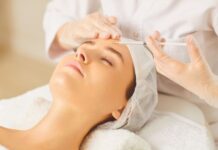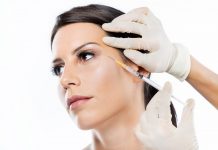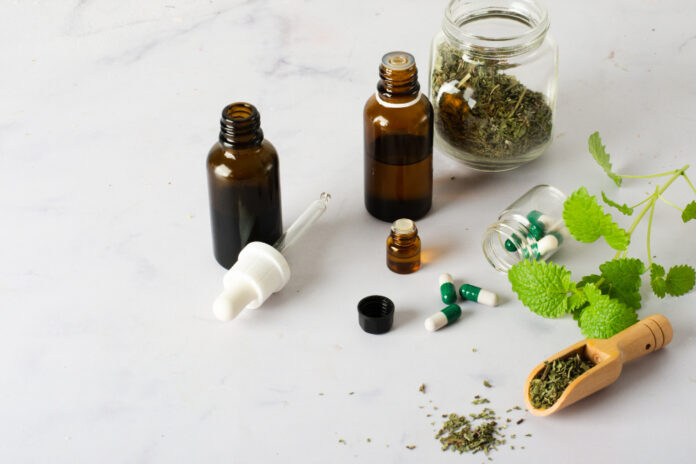Balancing estrogen levels is a vital part of maintaining overall hormonal health, especially for women navigating the different stages of life—from menstrual cycles to menopause. With the growing interest in holistic and natural wellness, many are turning to natural herbal supplements for balancing estrogen levels. These supplements, derived from centuries-old botanical wisdom, offer a gentle, plant-based approach to supporting the body’s natural hormonal rhythms.
In this comprehensive guide, we’ll explore how herbal supplements can aid in estrogen balance, delve into the science behind these natural remedies, and provide practical insights and tips for incorporating them into your wellness routine. Whether you’re seeking relief from hormonal fluctuations, easing menopausal symptoms, or simply looking to enhance your overall vitality, nature has a lot to offer.
Understanding Estrogen and Its Role in the Body
What Is Estrogen?
Estrogen is a group of hormones primarily responsible for the development and regulation of the female reproductive system and secondary sexual characteristics. However, its influence extends beyond reproduction, impacting bone health, cardiovascular function, mood, and even cognitive abilities.
Key functions of estrogen include:
- Regulating the menstrual cycle: Estrogen works in tandem with progesterone to prepare the body for pregnancy.
- Bone health: It helps maintain bone density, reducing the risk of osteoporosis.
- Cardiovascular support: Estrogen has been shown to have a positive effect on heart health.
- Mood regulation: Fluctuations in estrogen can influence mood and energy levels.
Why Balancing Estrogen Levels Matters
An imbalance in estrogen—whether it’s too high or too low—can lead to a variety of symptoms and health issues, such as:
- Menstrual irregularities: Irregular cycles, heavy bleeding, or amenorrhea (absence of menstruation).
- Menopausal symptoms: Hot flashes, night sweats, and mood swings.
- Weight gain and fatigue: Hormonal imbalances can affect metabolism and energy.
- Increased risk of chronic diseases: Long-term imbalances may contribute to osteoporosis, cardiovascular disease, and even certain cancers.
Understanding these effects underscores the importance of supporting estrogen balance, especially as our bodies undergo natural changes with age.
The Power of Natural Herbal Supplements
Herbal supplements have been used for centuries to support hormonal balance and overall health. Unlike synthetic hormones or pharmaceutical treatments, these natural remedies work in harmony with the body to gently influence hormone levels without harsh side effects.
How Herbal Supplements Work
Herbal supplements often work through one or more of the following mechanisms:
- Phytoestrogens: These plant-derived compounds have a similar structure to estrogen and can mimic or modulate its effects in the body. They can help balance estrogen levels by either binding to estrogen receptors or by influencing estrogen metabolism.
- Adaptogenic properties: Some herbs help the body adapt to stress, which can indirectly support hormonal balance by modulating the adrenal glands and the hypothalamic-pituitary-adrenal (HPA) axis.
- Antioxidant support: Many herbs provide antioxidants that protect cells from oxidative stress, a common factor in hormonal imbalances and aging.
Benefits of Herbal Supplements
- Gentle and Natural: They offer a holistic approach that works with the body’s natural rhythms.
- Fewer Side Effects: When used appropriately, herbal supplements typically have a lower risk of adverse effects compared to synthetic alternatives.
- Multifaceted Support: Many herbs offer additional benefits like anti-inflammatory effects, improved digestion, and enhanced mood.
Top Natural Herbal Supplements for Estrogen Balance
Let’s explore some of the most popular herbal supplements known for their potential to balance estrogen levels.
1. Black Cohosh (Actaea racemosa)
What It Is:
Black cohosh is a perennial herb native to North America, widely used for managing menopausal symptoms.
How It Helps:
- Hormonal Modulation: It is believed to act on estrogen receptors in the brain, which may help alleviate hot flashes, night sweats, and mood swings.
- Research Backing: Several studies suggest that black cohosh can significantly reduce menopausal discomfort. For instance, a study published in Menopause showed improvements in vasomotor symptoms.
Usage Tips:
- Typically taken as a standardized extract.
- Consult a healthcare provider before use, especially if you have liver concerns.
2. Red Clover (Trifolium pratense)
What It Is:
Red clover is rich in isoflavones, which are a type of phytoestrogen.
How It Helps:
- Phytoestrogen Effects: These compounds can bind to estrogen receptors and help balance estrogen levels, which is particularly beneficial during menopause.
- Bone Health: Some studies have also linked red clover with improved bone density, reducing the risk of osteoporosis.
Usage Tips:
- Can be consumed as a tea, tincture, or capsule.
- Best used as a complementary supplement alongside other lifestyle interventions.
3. Dong Quai (Angelica sinensis)
What It Is:
Often referred to as the “female ginseng,” dong quai has been a staple in traditional Chinese medicine for centuries.
How It Helps:
- Hormonal Regulation: Dong quai is traditionally used to support menstrual health and alleviate symptoms of menstrual irregularities.
- Blood Flow and Circulation: It may help improve blood circulation, which can enhance overall hormonal function.
Usage Tips:
- Usually taken as a decoction or extract.
- Not recommended for pregnant women or those with hormone-sensitive conditions without professional guidance.
4. Chasteberry (Vitex agnus-castus)
What It Is:
Chasteberry, or vitex, is a fruit extract known for its ability to influence the pituitary gland and modulate the production of luteinizing hormone (LH) and prolactin.
How It Helps:
- Menstrual Cycle Regulation: By balancing these hormones, chasteberry can help manage premenstrual syndrome (PMS) and other menstrual irregularities.
- Estrogen-Progesterone Balance: It promotes a healthy balance between estrogen and progesterone, which is essential for reproductive health.
Usage Tips:
- Commonly available as capsules or liquid extract.
- May take several weeks to notice benefits.
5. Maca Root (Lepidium meyenii)
What It Is:
Maca is a Peruvian root vegetable often used as an adaptogen to support energy, mood, and hormonal balance.
How It Helps:
- Adaptogenic Effects: Maca helps the body manage stress, which in turn supports hormonal equilibrium.
- Libido and Fertility: Some research suggests maca can enhance sexual function and fertility by balancing estrogen and other hormones.
Usage Tips:
- Available in powder form, capsules, or as a dietary supplement.
- Mix maca powder into smoothies, oatmeal, or other recipes for a nutritional boost.
Scientific Evidence Behind Herbal Estrogen Balance
The use of herbal supplements for hormone regulation is backed by both traditional use and modern scientific research. Here are some key findings:
- Phytoestrogen Research: Studies indicate that phytoestrogens in herbs like red clover can mimic estrogen in the body, binding to estrogen receptors and exerting a balancing effect. For instance, research from the Journal of Clinical Endocrinology & Metabolism has highlighted the potential of isoflavones in modulating estrogen activity.
- Clinical Trials on Black Cohosh: Several clinical trials have supported the use of black cohosh in reducing menopausal symptoms. The Menopause Journal has published findings demonstrating significant improvements in hot flashes and night sweats among users.
- Dong Quai in Traditional Medicine: Although research on dong quai is more limited compared to other herbs, its longstanding use in Traditional Chinese Medicine (TCM) provides a robust historical precedent for its effectiveness in promoting hormonal balance.
While these studies provide promising insights, it’s important to remember that herbal supplements work best when integrated into a balanced lifestyle that includes proper nutrition, exercise, and stress management.
Integrating Herbal Supplements Into Your Wellness Routine
1. Consult a Healthcare Professional
Before starting any herbal supplement, especially if you have a medical condition or are taking medications, consult with a healthcare provider. They can help determine the right dosage and identify any potential interactions.
2. Start Slow and Monitor Your Body
Introduce one herbal supplement at a time to monitor how your body responds. Keeping a wellness journal can help track improvements in symptoms such as mood swings, menstrual irregularities, or menopausal symptoms.
3. Combine With a Balanced Diet
Herbal supplements work best alongside a nutrient-rich diet. Consider incorporating foods that naturally support estrogen balance:
- Cruciferous Vegetables: Broccoli, kale, and Brussels sprouts help in estrogen metabolism.
- Whole Grains and Legumes: These foods provide fiber, which is essential for hormone regulation.
- Healthy Fats: Avocado, olive oil, and nuts support overall hormonal function.
4. Practice Stress-Reduction Techniques
Stress can wreak havoc on hormone levels. Incorporate practices like yoga, meditation, or even simple deep-breathing exercises into your daily routine to complement the benefits of herbal supplements.
5. Stay Consistent
Hormonal balance doesn’t happen overnight. Consistency is key. Commit to a regular routine of supplementation, diet, and lifestyle adjustments, and be patient with the process.
Real-Life Success Stories
Sarah’s Path to Hormonal Balance
Sarah, a 48-year-old marketing executive, experienced irregular menstrual cycles and disruptive menopausal symptoms. After consulting with her healthcare provider, she began incorporating black cohosh and chasteberry into her daily regimen. Over the course of several months, Sarah noticed a significant improvement in her symptoms—her cycles became more regular, and her hot flashes diminished. “I felt like I was finally regaining control over my body,” Sarah shared. Her experience underscores the potential of natural herbal supplements when used as part of a holistic approach.
Lisa’s Journey with Adaptogens
Lisa, a 35-year-old yoga instructor, struggled with the stress of balancing a busy lifestyle, which led to hormonal imbalances and fatigue. Incorporating maca root into her morning smoothies, along with practicing daily meditation, transformed her energy levels and mood. “It wasn’t just about one supplement; it was the entire lifestyle shift that made the difference,” Lisa explains. Her story highlights the synergy between natural herbs and a balanced, mindful approach to wellness.
Tips for Maximizing the Benefits of Herbal Supplements
- Quality Matters: Choose high-quality, organic supplements from reputable brands. Look for products that are third-party tested to ensure purity and potency.
- Combine with Lifestyle Changes: Herbal supplements should complement, not replace, healthy lifestyle choices such as regular exercise, balanced nutrition, and adequate sleep.
- Be Informed: Stay updated with current research and consider joining forums or communities focused on natural hormone balance. Resources like Dr. Mark Hyman’s website or The Weston A. Price Foundation offer valuable insights on holistic health.
Frequently Asked Questions
Q: Can herbal supplements completely replace hormone replacement therapy (HRT)?
A: Herbal supplements are designed to support and balance hormone levels naturally. However, they are not a direct substitute for HRT, especially in cases of severe hormonal imbalances. It’s crucial to discuss your options with a healthcare professional.
Q: How long does it take to notice improvements?
A: While individual responses vary, many people begin to notice improvements within 4 to 12 weeks of consistent use. Patience and consistency are key, as hormonal balance is a gradual process.
Q: Are there any side effects associated with these herbs?
A: Most natural herbal supplements are well-tolerated when taken at recommended dosages. However, some individuals may experience mild side effects such as digestive discomfort. Always start with a lower dose and gradually increase, and consult your healthcare provider if you have any concerns.
Embracing a Holistic Approach to Hormonal Health
Balancing estrogen levels naturally through herbal supplements is just one piece of the puzzle. Embracing a holistic lifestyle that includes balanced nutrition, stress management, regular physical activity, and sufficient sleep can amplify the benefits of these natural remedies. As you journey towards hormonal harmony, remember that every small, mindful change adds up to significant improvements in your overall well-being.
Are you ready to explore the benefits of natural herbal supplements for balancing estrogen levels? Start with one or two herbs that resonate with your body’s needs, integrate them into your daily routine, and observe the gradual transformation towards a more balanced, vibrant life.
Disclaimer
This article is intended for informational purposes only and does not constitute medical advice. Always consult with your healthcare provider before starting any new supplement regimen or making significant changes to your diet or lifestyle, especially if you have pre-existing health conditions or are currently taking medication.
































